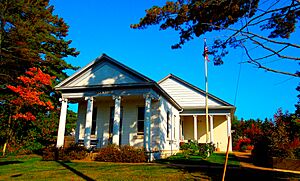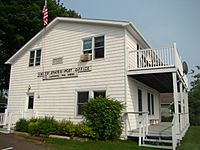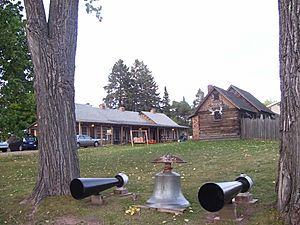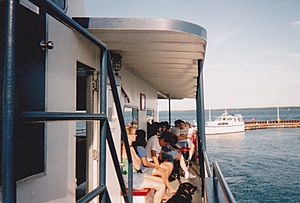La Pointe, Wisconsin facts for kids
Quick facts for kids
La Pointe, Wisconsin
|
|
|---|---|
|
Town
|
|

Town hall
|
|
| Country | |
| State | |
| County | Ashland |
| Area | |
| • Total | 202.4 km2 (78.1 sq mi) |
| • Land | 201.4 km2 (77.8 sq mi) |
| • Water | 1.0 km2 (0.4 sq mi) |
| Elevation | 190 m (610 ft) |
| Population
(2020)
|
|
| • Total | 428 |
| • Density | 2.1/km2 (5.5/sq mi) |
| Time zone | UTC-6 (Central (CST)) |
| • Summer (DST) | UTC-5 (CDT) |
| ZIP code |
54850
|
| Area code(s) | 715 & 534 |
| GNIS feature ID | 1567683 |
| GNIS feature ID | 1583529 |
La Pointe is a small town located in Ashland County, Wisconsin, United States. It's a special place because it includes almost all of the beautiful Apostle Islands. These islands are a group of islands in Lake Superior.
Most people who live in La Pointe actually live on Madeline Island. This is the biggest of the Apostle Islands. It's also the only one where homes and businesses can be built. In 2020, about 428 people lived here. The main part of La Pointe is right next to the ferry dock. This is where boats arrive and depart. The town also has a post office with the ZIP code 54850. The original name for this area in the Anishinaabe language is Mooningwanekaaning. This means "The Home of the Golden Breasted Woodpecker".
Contents
Geography of La Pointe
La Pointe covers a total area of about 78 square miles (202 square kilometers). Most of this area, about 77.6 square miles (201.4 square kilometers), is land. The rest is water.
Madeline Island is a very important part of the Town of La Pointe. A main road called County Highway H runs through the island. Close by is Chequamegon Bay, which is a part of Lake Superior.
A Look Back: History of La Pointe
La Pointe has a rich history, especially for the Ojibwa (also known as Chippewa) people. According to William Whipple Warren's book History of the Ojibway People, this spot was where the Ojibwa tribe first started. It was like a tree that grew and spread its branches. From here, many Ojibwa communities grew across a large area.
Early Trading Post
In the past, La Pointe was a fortified trading post for the French. This was between 1693 and 1698, and again from 1718 to 1759. Later, in the late 1700s, the town began to grow. It became an outpost for the American Fur Company. This company was led by Michel Cadotte, a well-known fur trader.
The Ojibwa's Sacred Place
The Ojibwa elders taught that their people originally lived near the St. Lawrence River. During a time of sickness, a spiritual guide named Manabosho helped them. They found a special plant called snakeroot. This plant helped them restore and prolong life through their religion, Medawe.
A shining seashell, called the Megis, guided them on a journey. It first led them to a place near Montreal. Then it led them to Sault Ste. Marie. Finally, it led them to Moningwunakauning, which is La Pointe on Madeline Island. The Ojibwa believe that the Megis has reflected light and blessed their ancestors with life, light, and wisdom ever since. For the Ojibwa, La Pointe is considered the center of the Earth.
Chief Buffalo's Leadership
Kechewaishke, also known as Chief Buffalo, was an important Ojibwa leader. He was born in La Pointe in 1759. For almost 50 years, until his death in 1855, he was the main chief of the Lake Superior Chippewa. He helped his people make treaties with the United States Government. He signed many treaties between 1825 and 1854.
Chief Buffalo also worked hard to stop the United States from moving the Ojibwa people away from their lands. He helped secure permanent reservations for his people near Lake Superior.
Today, you can learn more about the town's history at the Madeline Island Historical Museum.
People of La Pointe

According to the 2020 census, La Pointe had 428 residents. The town is home to people from various backgrounds. Most residents identify as White. There are also people who identify as Black or African American, Native American, and those from two or more races. A small percentage of the population identifies as Hispanic or Latino.
Fun for Visitors: Tourism
Tourism is a big part of La Pointe's economy. Like Bayfield on the mainland, La Pointe is a popular spot for tourists, especially in the summer. Many local events happen during the warmer months.
Downtown La Pointe has many places to eat and other services. You can find restaurants like Miijim, which serves local food. Its chef, Bryce Stevenson, was even recognized for his cooking in 2024! The island is also great for outdoor activities. You can go camping, swimming, and hiking.
Getting to La Pointe: Travel
You can reach Madeline Island and La Pointe by taking the Madeline Island Ferry. These ferries carry both cars and people. They leave from Bayfield on a regular schedule. Many attractions, like the museum and library, are close to the ferry dock. If you want to explore farther, like Big Bay State Park, you might need a car. County Highway H is the main road on the island.
There's also a public boat marina near the ferry dock for those who travel by boat.
Winter Travel
In the winter, usually from late December to February, you can get to the island by an ice road. This road is built over the frozen lake. It's only open when the ice is thick and safe enough for vehicles to drive on.
Airport Access
La Pointe also has a small airport called Major Gilbert Field Airport (airport code: 4R5). It has a landing strip that is 3,000 feet long. The airport offers services like overnight parking for planes. The Town of La Pointe owns and operates this airport.
Famous People from La Pointe
- Kechewaishke: A very important Native American leader.
- Michel Cadotte: A well-known fur trader in the early days.
- Ozhaguscodaywayquay: A notable Native American businesswoman.
- Thomas D. O'Brien: A Justice on the Minnesota Supreme Court.
- William Whipple Warren: A legislator from the Minnesota Territory.
Images for kids
See also
 In Spanish: La Pointe (Wisconsin) para niños
In Spanish: La Pointe (Wisconsin) para niños









